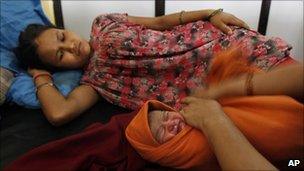UN launches $40bn woman and child health plan
- Published

Many women's lives could be saved by access to basic maternal healthcare
The UN has launched a $40bn (£25.5bn) health initiative aimed at saving the lives of 16 million women and children over the next five years.
Secretary General Ban Ki-moon said women and children "play a crucial role in development".
About eight million under-fives die every year and more than a third of a million women lose their lives during pregnancy or childbirth.
Funds for the plan have been pledged by governments and private aid groups.
Mr Ban announced the Global Strategy for Women's and Children's Health in New York, where some 140 world leaders are meeting to discuss progress towards achieving the UN's Millennium Development Goals (MDG).
The eight goals, adopted 10 years ago, aim to lift millions out of poverty, improve healthcare for the world's poorest people and increase access to education.
Progress on women and children's healthcare has been slower than on some of the other goals discussed at the three-day summit but Mr Ban said the coming century "must be and will be different for every woman and every child".
"We know what works to save women's and children's lives, and we know that women and children are critical to all of the Millennium Development Goals," he said in a statement.
"Women and children play a crucial role in development. Investing in their health is not only the right thing to do - it also builds stable, peaceful and productive societies."
The UN said $40bn had already been committed by foundations, international agencies and private individuals although it was unclear how much of the money was new funding.
Aid agencies welcomed the move but raised concerns about where the money was coming from.
Oxfam spokeswoman Emma Seery said half of all international donors cut their aid in 2009.
"We're just nervous that it will be governments bringing together a lot of previous commitments, and that won't mean much for poor people," she told the Associated Press news agency.
- Published20 September 2010
- Published21 September 2010
- Published21 September 2010
- Published8 June 2010